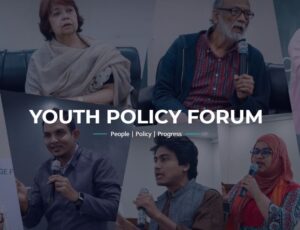Written By Syed Mostofa Moosa
In our anecdotal stories and global news bombarded with the aid of social media, we are increasingly having a grim view of polarized societies, and consequently, the world, and an erosion of legitimacy and trust in governments. Democratic norms are being threatened in many corners of the world. Politicians and young people are becoming increasingly distant. In a survey across 10 European countries found that 8% of people felt that politicians cared about what they think. One can only imagine what the proportion might be in our part of the world. Such a dissociation between the people and policymakers lead to bad policymaking in the least, and dangerous institutions (think parliaments, judiciary) in the worst.
Why is civic engagement and informed citizenry important? As Claudia Chwalisz from Center for Public Impact aptly points out, government’s “legitimacy depends on there being a strong link between the public will, public policies and public office-holders.” In a simple equation, more engaged citizens mean more accountability and hence better policy outcomes. On a deeper level, active citizenry is essential for democracy to work. In a democracy, people are not only voters – they are activists, watchdogs, and seekers of justice and sound governance. Informed citizens create a more tolerant and mindful society – a society able to work out its differences, find common grounds, and progress forward.
As we get bogged down by what is possible now, investments on the next generation is always a good bet. Gender-based violence, climate crisis, suppression or persecution of minorities are many issues that we will have to critically engage and battle out. Below I have outlined some evidence-based approaches to raise more informed citizens – a generation able to face the challenges we may have failed to overcome:
Teach children history, geography, and politics:
Research suggests, “Young people who know more about government are more likely to vote, discuss politics, contact the government, and take part in other civic activities than their less knowledgeable counterparts.” Teaching kids what worked and what did not work in the past is perhaps the greatest lesson we can impart to them. Additionally, research has shown that students who are taught geography and history tend to perform better in other subjects than those who are not.
Teach children good and bad citizenship:
Encourage children to volunteer, to clean up a commonly used space, and teach them their responsibilities in the house and outside. Instead of using traditional gender roles, teach them that their share of chores are a direct contributor of a more harmonious household. In a religiously aware society like ours, institutions like mosques and leaders like Imam can play a crucial role as well. Reward-based systems (called positive reinforcement in psychology) can be used to encourage children to clean their neighborhoods, or even just a mosque’s corridors, or even to be more mindful of their neighbor’s wellbeing. Apart from creating empathetic young people, this provides another benefit: a study in the journal Applied Developmental Science states that community engagement may provide mental health benefits for youth. Yet another study found that adolescents and young adults who voted, volunteered or engaged in activism had better life outcomes: They were more likely to stay in school longer and earned higher incomes than their peers.
Discuss recent issues and allow debate and disagreements:
Each generation has differing views on various issues than generations prior. They also have common views on many issues. It is in our ability to listen that we truly show our compassion and our commitment to learning. When we give young people the opportunity to opine, they feel more in control and they internalize the notion that their voices matter. Research finds that families who discuss current events and allow disagreements are more likely to raise young adults who vote and are civically engaged than those who don’t.
Teach children “real” student politics/governance:
Instead of partisan-based politics, we can engage students in school governments where serving their student body and institutions come above any other vested interests. Student governments act as laboratories for actual governments and democracy. Additionally, research has shown that students involved in “real” student politics do better in standardized tests and generally achieve academic success.
References:
- https://www.centreforpublicimpact.org/insights/citizen-views-better-policymaking
- https://www.washingtonpost.com/lifestyle/2018/11/02/how-raise-voter/
- http://www.ecs.org/clearinghouse/01/10/48/11048.pdf
- https://www.edweek.org/teaching-learning/opinion-creating-informed-citizens-should-be-educations-goal/2016/03

“YPF Policy Advocacy & Research”